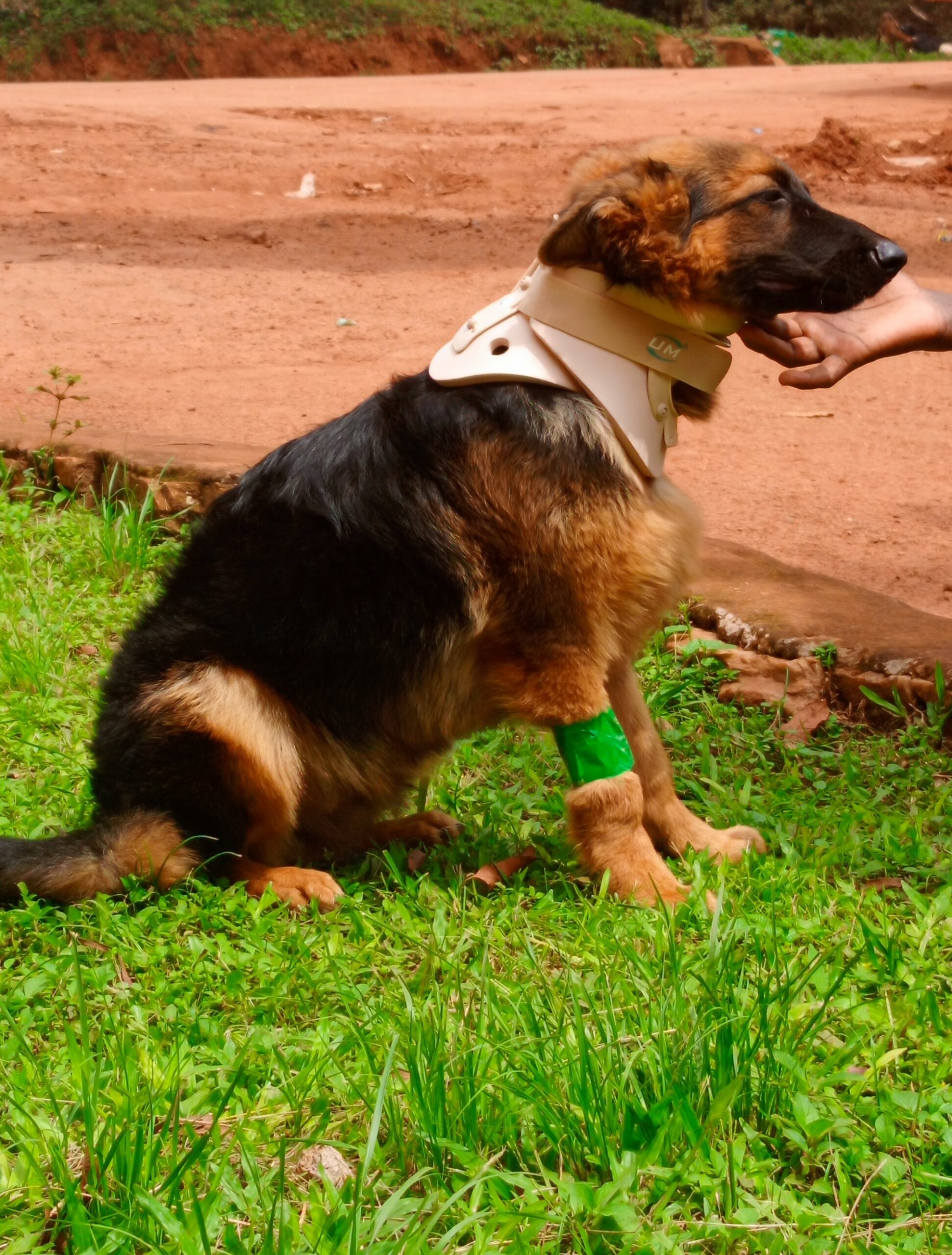
Is Your Dog Limping or Struggling to Move? It Could Be Arthritis
Imagine this: You’re walking your Labrador, Max, in Ntinda early in the morning. Usually, he’s excited, jumping around, sniffing every corner. But today, he hesitates to climb the curb, slows down, and even seems stiff when he stands. You brush it off, thinking he’s just tired—but over the next few days, you notice he’s less playful, struggles to jump on the couch, and sometimes even whimpers when moving.
What you might not realize is that Max could be suffering from arthritis, a condition that affects thousands of dogs across Makindye, Old Kampala, Lungujja, Kasubi, Nsambya, Katwe, and beyond. Arthritis isn’t just a minor inconvenience—it’s a painful joint disease that, if untreated, can seriously reduce your dog’s quality of life.
At Superior Animal Clinic, we see situations like Max’s every day. Dog owners often wonder: “Is this normal aging, or is my dog in pain?” That’s why early recognition and proper treatment are crucial. Whether your dog is limping, reluctant to play, or showing stiffness after rest, you don’t have to guess—our expert veterinarians are here to diagnose, treat, and help your dog regain a happy, active life.
Why Dog Arthritis Needs Urgent Attention
Arthritis in dogs isn’t just stiffness or limping. Left untreated, it can lead to chronic pain, reduced mobility, weight gain, and even behavioral changes like aggression or depression. Every dog owner in Kampala should treat arthritis promptly because early intervention can significantly improve your dog’s quality of life.
Common Causes of Arthritis in Dogs in Kampala
Arthritis in dogs is becoming increasingly common in Kampala, and understanding the root causes can help dog owners take proactive steps to protect their pets. At Superior Animal Clinic, we see a variety of factors that lead to joint problems and arthritis in dogs across Kampala, Uganda
1. Aging and Natural Wear & Tear
Just like humans, dogs’ joints naturally wear down over time. Senior dogs, especially those above 7–8 years, are more prone to osteoarthritis. This is the most common type we see at Superior Animal Clinic, particularly in larger breeds.
2. Obesity and Poor Diet
Extra weight puts tremendous stress on a dog’s joints, accelerating cartilage breakdown and causing inflammation. Dogs in urban areas like Kololo, Makindye, and Ntinda often have limited exercise and access to high-calorie diets, increasing their arthritis risk.
3. Genetics and Breed Predisposition
Certain breeds are naturally more susceptible. Large and giant breeds such as Labradors, German Shepherds, Golden Retrievers, Rottweilers, Boxers, and Dobermans have a higher chance of developing arthritis due to their size and joint structure. At Superior Animal Clinic, we tailor preventive and treatment plans based on breed-specific risks.
4. Joint Injuries or Trauma
Dogs that suffer fractures, ligament tears, or dislocations—common in active dogs in neighborhoods like Old Kampala, Nsambya, and Katwe—often develop arthritis in the injured joint later. Early veterinary care after any injury can prevent chronic arthritis.
5. Developmental Conditions
Conditions like hip dysplasia, elbow dysplasia, or patellar luxation are common in young dogs and often lead to arthritis as the dog grows. Early screening at Superior Animal Clinic allows us to manage these conditions before arthritis becomes severe.
6. Infections or Immune-Mediated Conditions
Though less common, bacterial or viral infections can inflame joints and trigger arthritis. Autoimmune conditions like rheumatoid arthritis can also affect certain dogs, requiring specialized care.
7. Lifestyle and Environment
Urban dogs in Makindye, Bugolobi, Muyenga, and Nakawa often live in apartments or limited spaces, which reduces exercise. Lack of regular movement can weaken muscles around joints, making dogs more prone to arthritis.
8. Previous Untreated Joint Problems
Sometimes arthritis develops because past joint pain, injuries, or minor inflammation was ignored. At Superior Animal Clinic, we emphasize early intervention, so mild joint problems don’t escalate into chronic arthritis.
9. Excessive High-Impact Exercise
Dogs that frequently run on hard surfaces, jump from heights, or participate in vigorous activities without proper conditioning can develop micro-injuries in their joints. Over time, these small injuries accumulate, leading to arthritis. Active dogs in Kololo, Makindye, and Muyenga are often at higher risk.
10. Hormonal Imbalances
Conditions like hypothyroidism can affect metabolism and cartilage health, making joints more prone to inflammation. Dogs with undiagnosed hormonal issues often develop arthritis earlier than healthy dogs.
11. Nutritional Deficiencies
A lack of essential nutrients, particularly omega-3 fatty acids, vitamins, and minerals like calcium and phosphorus, can weaken joint cartilage and reduce the body’s natural anti-inflammatory response. Dogs fed low-quality or unbalanced diets in urban areas like Lugogo, Bugolobi, and Nsambya are particularly vulnerable.
12. Repeated Stress or Overuse
Dogs that carry heavy loads (like guard dogs or working breeds in certain areas) or are forced to over-exercise can develop joint stress. Continuous overuse accelerates wear and tear in joints, especially hips and elbows.
13. Environmental Factors
Dogs exposed to damp or cold conditions, or uneven surfaces, may develop stiffness that eventually progresses into arthritis. Neighborhoods with muddy or uneven walking areas, like Rubaga, Lungujja, and Kasubi, can contribute to joint problems in dogs.
14. Inflammatory Joint Disorders
Some dogs develop arthritis due to chronic inflammation in the joints caused by autoimmune reactions or other inflammatory diseases. This type often requires specialized veterinary management.
15. Previous Surgeries or Orthopedic Procedures
Dogs that have undergone surgeries, especially joint or limb operations, may be at risk for post-surgical arthritis if rehabilitation is inadequate. Early physiotherapy is critical to prevent long-term joint degeneration.
16. Sedentary Lifestyle
Ironically, inactivity is a major contributor. Dogs that do not get sufficient exercise develop weak muscles and joint support structures, increasing arthritis risk. This is common among dogs living in apartments or urban homes in Nakasero, Makindye, and Ntinda.
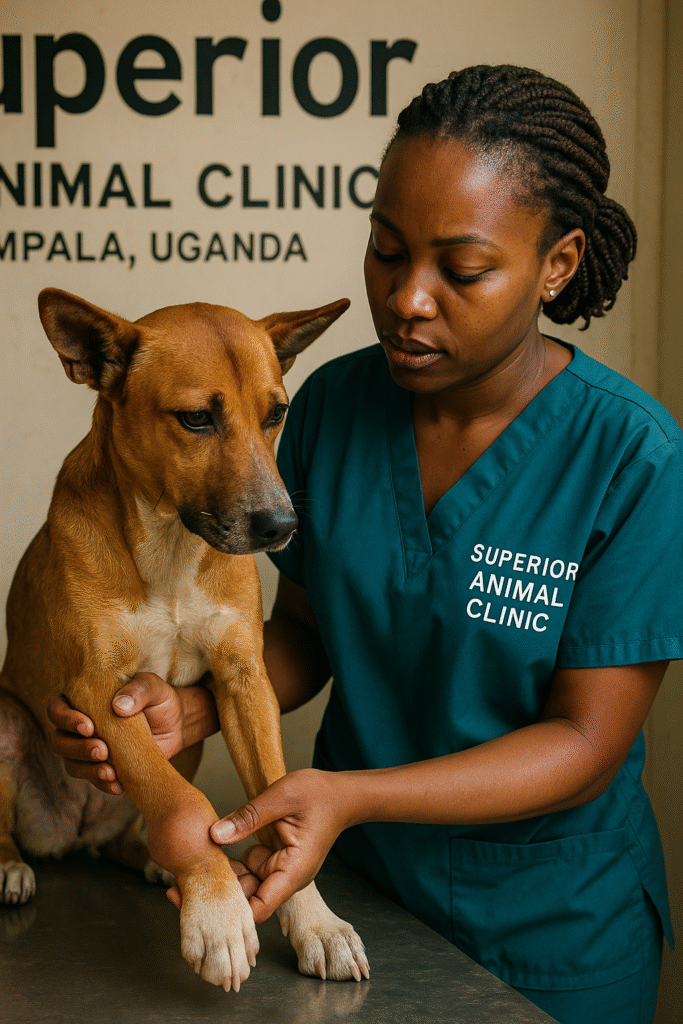
Tip for Kampala Dog Owners:
Recognizing these causes early is key. Regular check-ups, maintaining healthy weight, and prompt veterinary care can significantly delay or prevent arthritis in dogs. Superior Animal Clinic is here to help every dog owner across Kampala neighborhoods keep their pets active and pain-free.
Types of Arthritis Seen in Dogs in Uganda
At Superior Animal Clinic, we treat several types of arthritis in dogs, each with unique causes, symptoms, and treatment approaches. Understanding these types helps dog owners in Makindye, Ntinda, Old Kampala, Lungujja, Kasubi, Nsambya, Katwe, Zanta, Nakasero, Buziga, Munyonyo, Nakawa, Rubaga, Muyenga, Naguru, Bugolobi, Kabowa, Kabojja, Lugogo, Lubowa, Seguku, Ndejje, Kololo, Mutundwe, Bukoto, Bulindo, Kulambiro, and other parts of Kampala make informed decisions for their pets.
1. Osteoarthritis (Degenerative Joint Disease)
- What it is: The most common type of arthritis in dogs, caused by gradual wear and tear of joint cartilage.
- Who it affects: Older dogs, overweight dogs, and breeds prone to hip or elbow dysplasia like Labradors, German Shepherds, Boxers, and Rottweilers.
- Symptoms: Stiffness after rest, difficulty climbing stairs, limping, reluctance to play, or decreased activity.
- Treatment at Superior Animal Clinic: Pain management with veterinary-approved NSAIDs, joint supplements (glucosamine & chondroitin), weight management, physical therapy, and in severe cases, surgical intervention.
2. Rheumatoid Arthritis (Immune-Mediated Arthritis)
- What it is: An autoimmune condition where the dog’s immune system attacks its own joints, causing inflammation.
- Who it affects: Rare in Uganda, can affect dogs of any breed and age.
- Symptoms: Swollen, warm, and painful joints, fever, lethargy, and loss of appetite.
- Treatment: Immune-suppressing medications, anti-inflammatories, and supportive care tailored by our veterinary specialists.
3. Post-Traumatic Arthritis
- What it is: Arthritis that develops after joint injuries such as fractures, ligament tears, or dislocations.
- Who it affects: Active or working dogs, or dogs involved in accidents.
- Symptoms: Lameness that may worsen over time, joint swelling, and pain during movement.
- Treatment: Depending on severity, our approach may include surgery, pain relief, joint supplements, and rehabilitation exercises to restore mobility.
4. Developmental or Genetic Arthritis
- What it is: Arthritis caused by inherited joint abnormalities, often appearing in younger dogs.
- Who it affects: Breeds with hip and elbow dysplasia predispositions, including Golden Retrievers, Labradors, German Shepherds, and Rottweilers.
- Symptoms: Difficulty walking or running, early-onset limping, or reluctance to exercise.
- Treatment: Early veterinary intervention is critical. Treatments may include joint supplements, physiotherapy, weight management, and sometimes corrective surgery.
5. Septic (Infectious) Arthritis
- What it is: Arthritis caused by bacterial infections in the joints, though rare in Uganda.
- Who it affects: Dogs with immune deficiencies or dogs recovering from wounds or surgeries.
- Symptoms: Swollen, hot, painful joints, fever, and lethargy.
- Treatment: Antibiotics, anti-inflammatories, and supportive care, often requiring hospitalization at Superior Animal Clinic.
Key Takeaway:
No matter the type of arthritis, early diagnosis and treatment at Superior Animal Clinic can drastically improve your dog’s quality of life.
Predisposing Factors for Dogs in Kampala
Some factors make dogs in Kampala more likely to develop arthritis:
- Urban lifestyle with limited exercise
- High-calorie diets leading to obesity
- Poor access to preventive veterinary care
- Certain breeds commonly kept in the city
Symptoms Every Dog Owner Should Watch
- Limping or favoring a leg
- Difficulty climbing stairs or jumping
- Stiffness after rest
- Swollen joints
- Decreased activity or reluctance to play
If your dog shows these signs, it’s time to visit Superior Animal Clinic immediately.
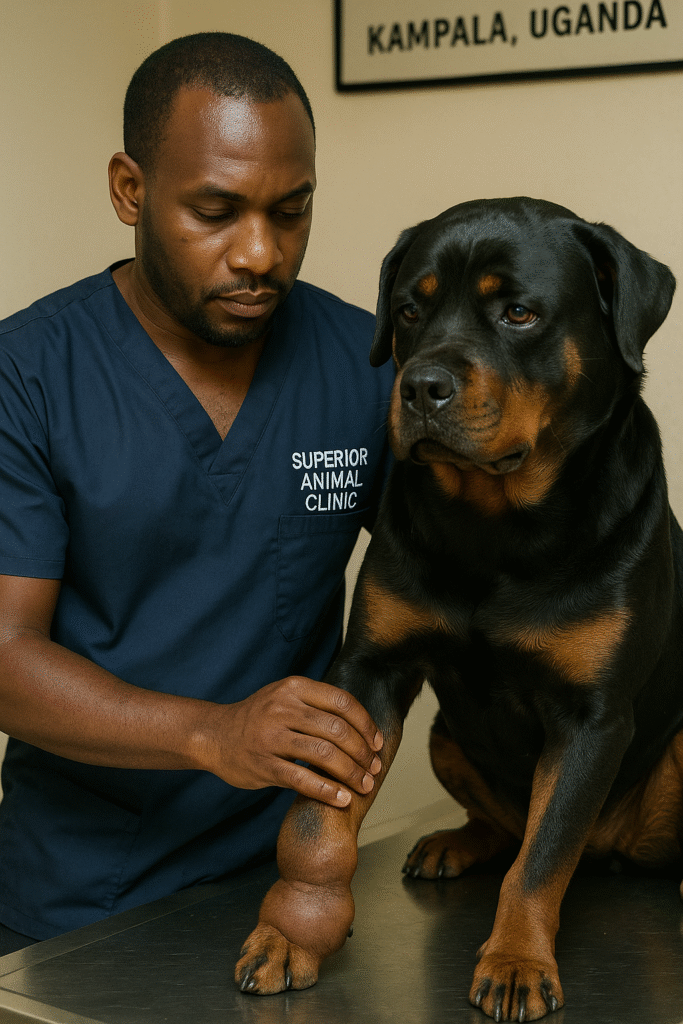
Dog Breeds in Uganda Most Prone to Arthritis and Why
While arthritis can affect any dog, certain breeds in Uganda are more susceptible due to genetics, body structure, and lifestyle. At Superior Animal Clinic, we see these breeds frequently for joint problems:
1. Labrador Retrievers
- Why prone: Labradors have a naturally large frame and are prone to obesity, which adds extra stress to their joints. They are also predisposed to hip and elbow dysplasia, common triggers for osteoarthritis.
- Typical signs: Limping after play, difficulty climbing stairs, and reduced activity.
2. German Shepherds
- Why prone: This breed often develops hip dysplasia and degenerative joint disease, especially in high-energy working dogs. Their rapid growth as puppies can strain developing joints.
- Typical signs: Stiffness in hind legs, reluctance to jump, or abnormal gait.
3. Boxers
- Why prone: Boxers are muscular dogs with a deep chest and strong forelimbs, which sometimes leads to shoulder and elbow arthritis as they age. They are also prone to joint injuries during play.
- Typical signs: Swollen joints, limping, or decreased enthusiasm for exercise.
4. Golden Retrievers
- Why prone: Similar to Labradors, Golden Retrievers are large, active dogs that carry extra weight easily. They often develop hip and elbow arthritis as they age.
- Typical signs: Difficulty rising from rest, reluctance to run, or mild lameness in one leg.
5. Rottweilers
- Why prone: Rottweilers are heavy, strong dogs. Their size and weight put extra stress on hip, elbow, and knee joints, making them prone to arthritis at a relatively young age.
- Typical signs: Limping, reduced playtime, and stiffness after sleep.
6. Dobermans
- Why prone: Dobermans often develop degenerative joint disease due to genetic factors. Their long limbs make them vulnerable to hip and elbow arthritis.
- Typical signs: Difficulty climbing stairs, soreness after exercise, or reduced mobility.
7. Local and Mixed Breeds
- Why prone: Even Ugandan local dogs are not immune. Larger mixed breeds or dogs that are overweight, highly active, or have had joint injuries can develop arthritis.
- Typical signs: Reluctance to run or jump, limping, or behavioral changes like irritability.
8. Beagles
- Why prone: Beagles are smaller but very active, which can lead to repetitive joint stress, especially in their hips and knees. Obesity also increases their risk.
- Typical signs: Limping after play, stiffness after rest, reluctance to climb stairs.
9. Cocker Spaniels
- Why prone: Prone to hip and elbow dysplasia and joint degeneration due to their compact body and active lifestyle. They can also develop arthritis in shoulders.
- Typical signs: Lameness in one leg, difficulty jumping onto furniture, reluctance to walk long distances.
10. Chow Chows
- Why prone: Large, heavy-set dogs with slower metabolism. They are prone to hip dysplasia and osteoarthritis as they age.
- Typical signs: Slow movement, stiffness, difficulty getting up after rest.
11. Shar Peis
- Why prone: Muscular and stocky, Shar Peis often experience elbow and hip arthritis. Rapid growth in puppies can also stress joints.
- Typical signs: Reluctance to play, limping, stiffness in the morning.
12. Saint Bernards
- Why prone: Giant breed dogs are at high risk for hip, elbow, and knee arthritis due to their weight. They also tend to develop arthritis earlier than smaller breeds.
- Typical signs: Difficulty standing, reluctance to walk, joint swelling.
13. Great Danes
- Why prone: Their massive size and rapid growth rate put stress on all major joints, especially hips and elbows. Degenerative joint disease is common.
- Typical signs: Limping, stiffness after sleep, trouble climbing stairs.
14. Bulldogs (English & French)
- Why prone: Bulldogs have heavy bodies and short legs, making hip and elbow arthritis common. Their unique structure stresses joints and cartilage.
- Typical signs: Stiffness, difficulty moving, joint pain after minor activity.
15. Pugs
- Why prone: Despite being small, Pugs can develop arthritis due to obesity and joint malformations like patellar luxation (knee dislocation).
- Typical signs: Hesitant to jump, limping, decreased activity.
16. Terriers (Staffordshire, Bull, Border)
- Why prone: These active dogs may develop arthritis from joint injuries sustained during play or exercise, especially elbows and knees.
- Typical signs: Limping, stiffness, reluctance to play or jump.
Why Breed Matters for Dog Owners in Kampala
Understanding which breeds are predisposed helps dog owners act early. Early intervention, proper diet, weight management, and veterinary care at Superior Animal Clinic can prevent or slow arthritis progression in these vulnerable breeds.
⚠️ Tip: Even if your dog isn’t one of these breeds, regular joint checkups are essential—arthritis can affect any dog if ignored.
How Arthritis in Dogs is Treated in Uganda at Superior Animal Clinic
At Superior Animal Clinic, we understand that each dog is unique, and arthritis affects dogs differently depending on age, breed, lifestyle, and severity. That’s why our approach is personalized, comprehensive, and evidence-based. Here’s exactly what happens when you bring your dog to us for arthritis treatment:
1. Comprehensive Veterinary Examination
Our veterinarians start with a thorough physical assessment of your dog’s joints, muscles, and overall mobility. We carefully observe:
- Limping or stiffness patterns
- Swelling or heat in the joints
- Muscle wastage around affected areas
- Your dog’s gait and posture
This hands-on evaluation helps identify which joints are affected and the severity of arthritis.
2. Advanced Diagnostic Tests
To confirm arthritis type and severity, we use:
- X-rays (Radiography): Shows joint space narrowing, bone spurs, or cartilage loss.
- Blood tests: Checks for inflammation, infection, or autoimmune conditions.
- Joint fluid analysis: Detects infections or crystals causing joint inflammation.
- Ultrasound (if needed): Evaluates soft tissues and ligaments around joints.
These tests allow us to design a customized treatment plan for your dog.

3. Medical Management
Depending on the arthritis type, we prescribe safe and effective medications:
- NSAIDs (Non-Steroidal Anti-Inflammatory Drugs): Reduce pain and inflammation.
- Pain management medications: Especially for severe discomfort.
- Joint supplements: Glucosamine, chondroitin, Omega-3 fatty acids, and MSM to support cartilage health.
- Disease-modifying drugs: For specific types of arthritis like rheumatoid arthritis.
We carefully monitor your dog for any side effects and adjust doses as needed.
4. Weight Management & Diet Planning
Excess weight strains joints, worsening arthritis. At Superior Animal Clinic, we:
- Conduct body condition scoring for your dog
- Recommend calorie-controlled diets tailored to your dog’s size and breed
- Provide guidance on healthy treats and supplements
This helps reduce joint stress and improves mobility.
5. Physical Therapy & Rehabilitation
Movement is medicine for arthritic dogs. Our clinic offers:
- Hydrotherapy (water treadmill): Gentle exercise to strengthen muscles without straining joints
- Controlled exercises: Stretching, range-of-motion routines, and low-impact activities
- Massage therapy: Relieves stiffness and improves blood circulation
6. Surgical Interventions (if necessary)
For severe or advanced arthritis that doesn’t respond to medications, we offer:
- Arthroscopy: Minimally invasive joint repair
- Joint replacement surgery: For hips or knees severely damaged by arthritis
- Corrective procedures: For congenital or injury-related joint problems
Our veterinary surgeons are experienced in advanced orthopedic procedures, ensuring safe and effective outcomes.
7. Home Care & Lifestyle Adjustments
We guide dog owners on how to care for arthritic dogs at home, including:
- Comfortable bedding with joint support
- Limiting stairs or jumping for older dogs
- Safe exercises to maintain muscle strength
- Administering medications and supplements correctly
8. Follow-Up & Monitoring
Arthritis is a chronic condition that requires ongoing care. We schedule regular follow-ups to:
- Monitor your dog’s progress
- Adjust medications or supplements as needed
- Update exercise and diet plans
- Detect early signs of worsening arthritis
Why This Approach Works
At Superior Animal Clinic, our multi-step, personalized treatment plan ensures:
- Pain is effectively managed
- Mobility and quality of life are restored
- Progress is monitored consistently
- Owners are empowered with knowledge for home care
Home Remedies for Dog Arthritis in Uganda
While veterinary care is essential for managing arthritis, certain home remedies can support your dog’s joint health, reduce pain, and improve mobility. These remedies are specifically practical for dog owners in Uganda and can complement professional treatment at Superior Animal Clinic.
1. Weight Management with Locally Available Foods
Maintaining a healthy weight reduces joint stress.
- Feed your dog high-quality proteins like chicken, fish, or goat meat in moderation.
- Include fiber-rich foods like pumpkin, carrots, and green beans to help with satiety and weight control.
- Avoid giving excessive starchy foods like white rice or too many scraps, as obesity worsens arthritis.
2. Controlled Exercise
Low-impact exercise strengthens muscles around the joints without causing damage.
- Short walks in safe neighborhood areas like Kololo, Ntinda, or Makindye.
- Gentle swimming or wading in clean, shallow water in private pools or safe lakes.
- Avoid jumping on stairs or rough play on hard concrete, which can worsen joint pain.
3. Warm Compresses
Heat soothes stiff joints and improves blood flow.
- Use a warm towel or water bottle wrapped in cloth on swollen joints for 10–15 minutes, 1–2 times daily.
- Ensure it’s warm, not hot, to prevent burns.
4. Massage Therapy
Gentle massage helps reduce stiffness and improves mobility.
- Massage around the shoulders, hips, and back.
- Use circular motions and gentle pressure, avoiding inflamed joints.
- Regular short sessions (5–10 minutes) can make your dog more comfortable.

5. Omega-3 Fatty Acids from Local Sources
Omega-3s reduce inflammation naturally.
- Include small portions of fish oil or crushed sardines in meals.
- Can also feed fresh Nile perch or tilapia occasionally as a supplement source.
- Always consult your vet at Superior Animal Clinic to determine safe doses.
6. Supportive Bedding
Soft bedding relieves pressure on painful joints.
- Provide foam or orthopedic beds in a quiet, warm area.
- Avoid hard floors or cold tiles, especially in areas like Ntinda, Kololo, or Old Kampala where homes may have concrete flooring.
7. Herbal Support (Vet Approved)
Some herbs can support joint health when used carefully:
- Turmeric: Contains curcumin, an anti-inflammatory compound. Add small amounts to food (as advised by a vet).
- Ginger: Can reduce mild inflammation but should be used sparingly.
- Always check with a vet before using herbal remedies.
8. Environmental Adjustments
Making your dog’s surroundings safe and comfortable helps reduce strain:
- Use ramps instead of stairs for older dogs.
- Keep walkways free of obstacles to avoid slipping.
- Ensure shaded areas outdoors to prevent overheating, which can worsen stiffness.
9. Routine Monitoring at Home
- Observe mobility daily: note limping, stiffness, or reluctance to play.
- Track pain levels and report changes to Superior Animal Clinic.
- Early detection of worsening arthritis ensures timely intervention.
✅ Key Tip for Kampala Dog Owners:
Home remedies alone are not enough for long-term relief. They are supportive measures and work best when combined with veterinary care, medications, and joint supplements. Superior Animal Clinic can guide you on the safest combination of home care and medical treatment for your dog.
Prognosis: What Happens If You Don’t Treat Arthritis
Without treatment, dogs can suffer:
- Chronic pain
- Reduced mobility
- Weight gain
- Joint deformities
- Poor overall quality of life
Prompt treatment at Superior Animal Clinic ensures your dog stays happy, mobile, and pain-free.
Preventing Arthritis in Dogs in Kampala
- Maintain a healthy weight
- Provide balanced diets
- Regular vet checkups
- Avoid excessive high-impact activity in young dogs
- Early intervention if your dog has joint injuries
Areas in Kampala & Uganda Where Dog Arthritis Is Common — And Why
Dog arthritis is increasingly common in many parts of Kampala and surrounding districts in Uganda, and understanding why it happens in specific areas can help dog owners prevent or manage it better. At Superior Animal Clinic, we’ve noticed patterns based on lifestyle, dog populations, and urban environment. Here’s a breakdown:
1. Makindye
- Why it’s common: Many urban dogs in Makindye are kept as indoor pets with limited exercise. Overweight dogs and older pets are more prone to arthritis.
- Tip for owners: Regular short walks and joint supplements recommended by Superior Animal Clinic help reduce arthritis risk.
2. Ntinda & Old Kampala
- Why it’s common: High-density neighborhoods with small yards often limit physical activity for dogs. Obesity and lack of exercise accelerate joint problems.
3. Lungujja & Kasubi
- Why it’s common: Mixed-breed and purebred dogs in these areas often face injuries from playing on hard surfaces or stairs, leading to post-traumatic arthritis.
4. Nsambya & Katwe
- Why it’s common: Dogs in these central areas are often older pets kept indoors. Sedentary lifestyles, combined with rich diets, contribute to osteoarthritis.
5. Nakasero & Kololo
- Why it’s common: Wealthier households often own larger breeds like Labradors, Golden Retrievers, and Rottweilers. These breeds are genetically predisposed to arthritis. Lack of early preventive care worsens the problem.
6. Buziga & Munyonyo
- Why it’s common: These lakeside neighborhoods have large compounds, and while dogs have space to move, some breeds are prone to hip or elbow dysplasia, making arthritis more likely as they age.
7. Nakawa, Rubaga & Bugolobi
- Why it’s common: Urban traffic, hard pavements, and limited exercise areas can lead to joint injuries, which later develop into arthritis.
8. Muyenga, Naguru & Lugogo
- Why it’s common: These hilly areas pose extra stress on older dogs’ joints. Climbing stairs and uneven terrain exacerbate arthritis symptoms.
9. Kabowa, Kabojja & Lubowa
- Why it’s common: Suburban dogs are often mixed breeds with less frequent vet checkups. Arthritis develops silently until the dog shows stiffness or limping.
10. Seguku, Ndejje, Mutundwe & Bulindo
- Why it’s common: Semi-rural lifestyle means dogs may overexert themselves on farms or uneven terrain, increasing the risk of joint wear and post-traumatic arthritis.
11. Kulambiro & Bukoto
- Why it’s common: Young dogs are active and playful but sometimes face injuries. Older dogs often remain indoors, leading to stiffness and weight-related arthritis.
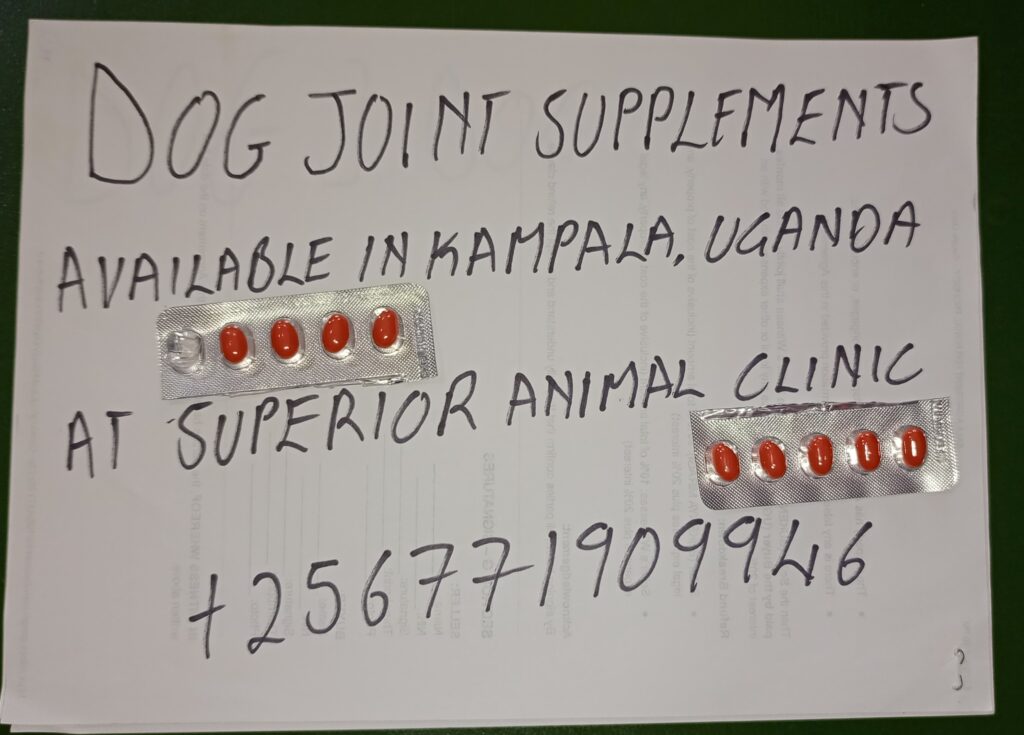
Key Takeaways for Dog Owners in Kampala
- Breed matters: Large breeds like Labradors, German Shepherds, Rottweilers, Boxers, and Golden Retrievers are more prone to arthritis in any neighborhood.
- Urban lifestyle: Indoor dogs with little exercise are at higher risk.
- Injury and terrain: Hard pavements, hilly areas, and stairs increase the risk of post-traumatic arthritis.
- Obesity: Overfeeding and sedentary habits make arthritis worse.
🐾 Tip: Wherever your dog lives in Kampala or surrounding districts, early checkups and preventive care at Superior Animal Clinic are crucial. We provide neighborhood-specific guidance for diet, exercise, and joint care to help your dog stay active and pain-free.
Why Superior Animal Clinic is the Best Choice for Dog Arthritis in Kampala
- Experienced veterinarians specializing in joint disorders
- Advanced diagnostics and treatment options
- Holistic approach: medical, surgical, and physical therapy
- Personalized care for every dog
- Trusted by dog owners across all Kampala neighborhoods
If your dog lives in Makindye, Ntinda, Old Kampala, Lungujja, Kasubi, Nsambya, Katwe, Zanta, Nakasero, Buziga, Munyonyo, Nakawa, Rubaga, Muyenga, Naguru, Bugolobi, Kabowa, Kabojja, Lugogo, Lubowa, Seguku, Ndejje, Kololo, Mutundwe, Bukoto, Bulindo, Kulambiro, Superior Animal Clinic is your go-to clinic for arthritis treatment.
Frequently Asked Questions About Dog Arthritis in Kampala, Uganda
1. What are the early signs of arthritis in dogs in Kampala?
Limping, stiffness, reluctance to jump, swelling, or decreased activity are common early signs. Dog owners in Makindye, Ntinda, and Old Kampala should watch for these symptoms.
2. Can arthritis in dogs be cured in Uganda?
While there is no complete cure, treatment at Superior Animal Clinic in Kampala can manage pain, improve mobility, and enhance quality of life.
3. Which dog breeds are most affected by arthritis in Kampala?
Large breeds like Labradors, German Shepherds, Boxers, Golden Retrievers, and Rottweilers are most prone to arthritis, especially in urban neighborhoods like Kololo, Nakasero, and Lugogo.
4. How much does dog arthritis treatment cost in Makindye or Kampala?
Treatment costs vary depending on the dog’s size, type of arthritis, and severity. Superior Animal Clinic offers affordable, personalized treatment plans across all Kampala neighborhoods. Ranging from UGX 80,000 to 450,000
5. Are joint supplements effective for dogs in Uganda?
Yes. Vet-recommended glucosamine and chondroitin supplements, combined with medical treatment at Superior Animal Clinic, support joint health and reduce arthritis symptoms.
6. Can arthritis in dogs be prevented in Kampala?
Yes. Maintaining a healthy weight, providing a balanced diet, ensuring regular exercise, and scheduling early vet checkups are key preventive measures in areas like Ntinda, Buziga, and Munyonyo.
7. How long does it take for a dog to recover from arthritis in Uganda?
Recovery depends on severity and treatment type. With proper care at Superior Animal Clinic, many dogs regain mobility and reduce pain within 2-4 weeks.
8. Is surgery necessary for dog arthritis in Kampala?
Surgery is only required for severe cases where medical management and physical therapy are insufficient. Superior Animal Clinic provides advanced surgical options for complex arthritis cases.
9. Are there natural or home remedies for dog arthritis in Kampala?
Supportive remedies like warm compresses, controlled low-impact exercise, and vet-approved supplements can help, but professional treatment at Superior Animal Clinic is essential for long-term relief.
10. Why choose Superior Animal Clinic for dog arthritis treatment in Kampala?
We provide expert veterinarians, advanced diagnostics, personalized treatment, physical therapy, and neighborhood-specific guidance for all areas including Makindye, Ntinda, Old Kampala, Lungujja, Kasubi, Nsambya, Katwe, Zanta, Nakasero, Buziga, Munyonyo, Nakawa, Rubaga, Muyenga, Naguru, Bugolobi, Kabowa, Kabojja, Lugogo, Lubowa, Seguku, Ndejje, Kololo, Mutundwe, Bukoto, Bulindo, and Kulambiro.
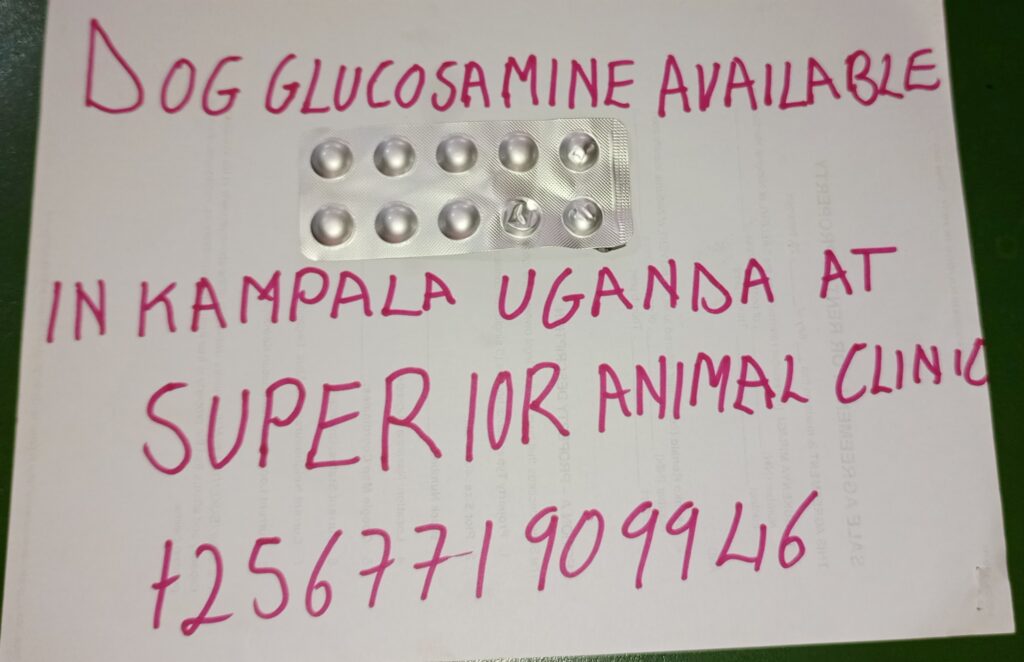
11. What happens if dog arthritis is left untreated in Kampala?
Untreated arthritis can cause chronic pain, reduced mobility, joint deformities, and a poor quality of life. Early intervention at Superior Animal Clinic can prevent these complications.
12. Can senior dogs in Kampala still benefit from arthritis treatment?
Absolutely. Senior dogs, even in areas like Muyenga, Kololo, or Old Kampala, can improve their mobility and reduce pain with targeted treatment plans.
13. How do I know if my dog in Lugogo or Nakawa has arthritis?
Signs include limping, stiffness, reluctance to play or climb stairs, swollen joints, and behavioral changes like irritability or reduced activity.
14. Do urban dogs in Kampala have a higher risk of arthritis?
Yes. Indoor lifestyles, limited exercise, obesity, and lack of preventive care make dogs in neighborhoods like Ntinda, Makindye, Bugolobi, and Kololo more prone to arthritis.
15. Can physical therapy help dogs with arthritis in Uganda?
Yes. Superior Animal Clinic provides hydrotherapy, controlled exercises, and massage therapy to improve mobility and reduce joint pain for dogs across Kampala.
16. Are there different types of arthritis in dogs treated at Superior Animal Clinic?
Yes. We treat osteoarthritis, rheumatoid arthritis, post-traumatic arthritis, and developmental or genetic arthritis in dogs across all Kampala neighborhoods.
17. How do I book an appointment for dog arthritis treatment in Makindye or Kampala?
You can call Superior Animal Clinic directly or visit our clinic along Salaama Road, Makindye, for an evaluation and customized arthritis treatment plan.
18. Who is the best vet for dog arthritis in Kampala?
Superior Animal Clinic in Makindye is considered the best vet for dog arthritis in Kampala, offering expert care, advanced diagnostics, and personalized treatment plans for all dog breeds.
19. Which is the best animal hospital for treating dog arthritis in Uganda?
Superior Animal Clinic is the top-rated animal hospital for arthritis treatment in Uganda, serving neighborhoods like Ntinda, Old Kampala, Kololo, Lugogo, Makindye, and beyond.
20. Can young dogs in Kampala develop arthritis?
Yes. Puppies or young dogs with genetic joint issues, hip/elbow dysplasia, or injuries can develop arthritis if untreated early.
21. How often should I take my dog for arthritis checkups in Kampala?
Dogs at risk or already diagnosed with arthritis should have vet checkups every 3–6 months. Superior Animal Clinic provides follow-ups and neighborhood-specific care plans.
22. Are certain diets better for dogs with arthritis in Kampala?
Yes. Diets rich in omega-3 fatty acids, glucosamine, and controlled calories help manage arthritis symptoms. Superior Animal Clinic can design custom meal plans.
23. How can I manage arthritis pain in dogs at home in Kampala?
Controlled exercise, warm compresses, and vet-approved joint supplements can help, but veterinary supervision at Superior Animal Clinic is essential.
24. Do urban or city dogs in Kampala experience arthritis more than rural dogs?
Yes. Dogs in densely populated areas like Ntinda, Old Kampala, and Makindye often face obesity and limited exercise, increasing arthritis risk.
25. Can arthritis affect small dog breeds in Kampala?
While large breeds are more prone, small breeds can develop arthritis due to injury, obesity, or genetic factors. Superior Animal Clinic treats all sizes of dogs.
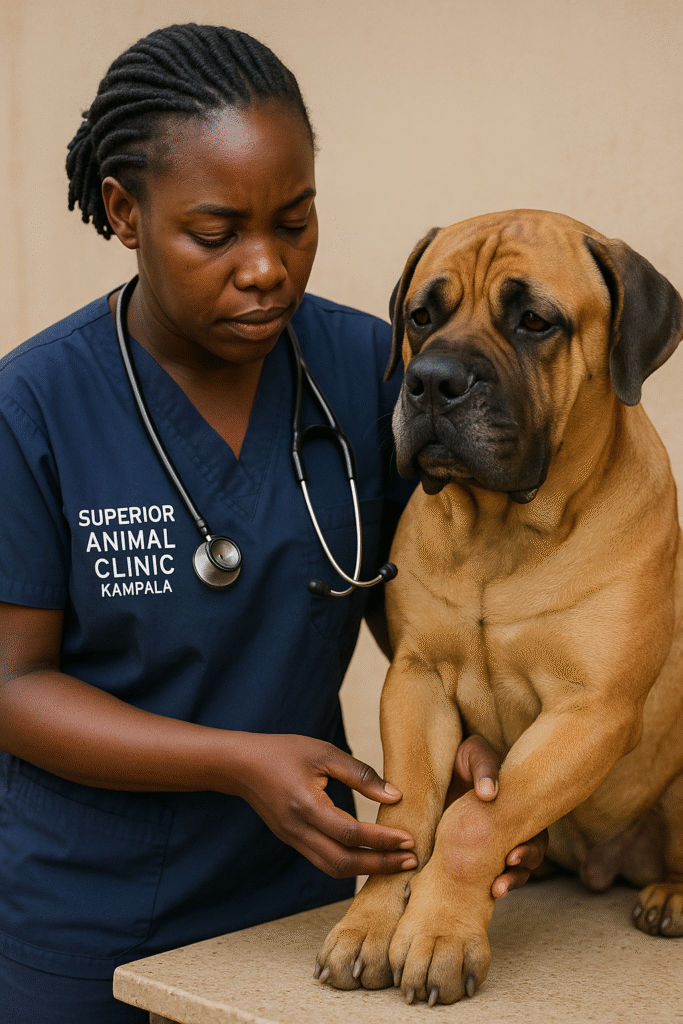
26. Are there advanced treatments for severe arthritis at Superior Animal Clinic?
Yes. We provide surgery, arthroscopy, physical therapy, hydrotherapy, and targeted medications for severe arthritis cases.
27. How long does an arthritis treatment plan take at Superior Animal Clinic in Kampala?
Treatment duration depends on severity but usually involves weeks to months of combined medication, supplements, and physical therapy.
28. Can arthritis in dogs in Kampala cause behavioral changes?
Yes. Dogs in pain may become irritable, anxious, or less active. Prompt treatment at Superior Animal Clinic improves both mobility and behavior.
29. Is hydrotherapy effective for dogs with arthritis in Kampala?
Absolutely. Hydrotherapy reduces joint stress, improves mobility, and is available at Superior Animal Clinic for dogs across all Kampala neighborhoods.
30. Can arthritis in dogs be reversed or fully cured in Uganda?
Arthritis can’t be fully cured, but treatment at Superior Animal Clinic can halt progression, relieve pain, and restore mobility.
31. Why is Superior Animal Clinic considered the best vet clinic for dog arthritis in Makindye and Kampala?
Because of our experienced veterinarians, advanced diagnostic tools, comprehensive treatment options, and personalized care for dogs in all neighborhoods including Ntinda, Old Kampala, Lugogo, Kololo, Buziga, and Munyonyo.
32. What neighborhoods in Kampala see the highest cases of dog arthritis?
High-density urban areas like Ntinda, Makindye, Old Kampala, Kololo, and Lugogo see more arthritis due to limited exercise, obesity, and aging dogs.
33. Can arthritis in dogs lead to other health problems if untreated?
Yes. Untreated arthritis can cause obesity, muscle loss, mobility issues, and chronic pain. Early intervention at Superior Animal Clinic prevents complications.
34. Are anti-inflammatory medications safe for dogs in Uganda?
Yes, when prescribed by veterinarians at Superior Animal Clinic. Never give human medications to dogs, as they can be toxic.
35. Does Superior Animal Clinic provide emergency care for dogs with severe arthritis pain in Kampala?
Yes. Our clinic in Makindye is equipped to handle urgent arthritis flare-ups for dogs across all neighborhoods in Kampala.
Final Thoughts
Dog arthritis is a serious condition, but with early intervention and proper care, your furry friend can live a happy, active life. Don’t wait—bring your dog to Superior Animal Clinic in Makindye, Kampala, today, and let our experts help your dog move freely again.
📍 Serving all dog owners in Kampala neighborhoods: Ntinda, Old Kampala, Lungujja, Kasubi, Nsambya, Katwe, Zanta, Nakasero, Makindye, Buziga, Munyonyo, Mityana, Nakawa, Rubaga, Muyenga, Naguru, Bugolobi, Kabowa, Kabojja, Lugogo, Lubowa, Seguku, Ndejje, Kololo, Mutundwe, Bukoto, Bulindo, Kulambiro.

best first time steroid cycle
References:
https://bom.so
grand casino hinckley
References:
https://egosargentinos.com.ar/
adverse effects of anabolic steroids
References:
https://wikimapia.org
slots on line
References:
meetmyholiders.com
stations casinos
References:
https://luxnews.com.br/
swiss casino online
References:
https://intuitionphoto.com/ryan-michelles-first-look-new-edinburgh/
legit steroids sites
References:
https://notes.io/
is trenbolone legal
References:
apunto.it